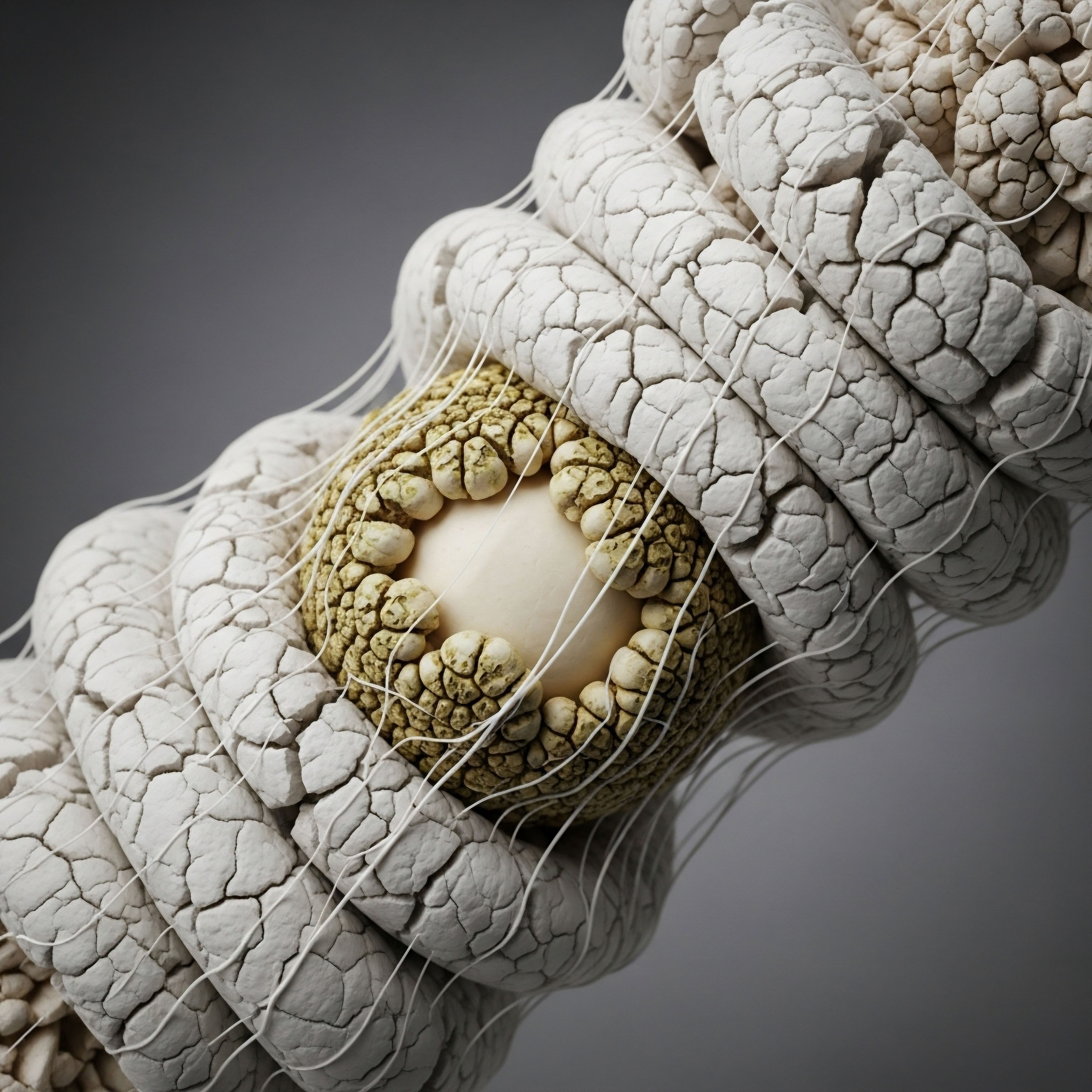

The Neurochemical Reality of Pressure
The modern human condition often frames stress as an abstract mental burden, a nebulous adversary residing solely within thought patterns. This perspective misses the fundamental truth. Stress manifests as a precise, measurable chemical state within the intricate architecture of your biology. It represents a sophisticated, ancient alarm system, designed for acute survival, now frequently over-activated in a world of chronic demands. Understanding this distinction provides the key to reclaiming physiological autonomy.
Your body, a high-performance system, responds to perceived threats with a cascade of neuroendocrine signals. The hypothalamic-pituitary-adrenal (HPA) axis stands as the central command, orchestrating the release of powerful agents such as cortisol and catecholamines ∞ adrenaline and noradrenaline. These molecules surge through your bloodstream, initiating a system-wide recalibration.
Heart rate accelerates, blood pressure rises, and glucose floods the system, preparing for immediate action. This acute response, a marvel of evolutionary engineering, ensures survival in moments of danger.
Chronic activation of the HPA axis can lead to sustained cortisol elevation, impairing insulin sensitivity and contributing to visceral adiposity.
The challenge arises when this acute response becomes a chronic default. Sustained elevation of stress hormones remodels neural pathways, dampens immune function, and disrupts metabolic harmony. Cortisol, designed for transient bursts, begins to erode the very systems it initially protects. It influences gene expression, alters neurotransmitter synthesis, and suppresses the delicate balance of your endocrine network. The pervasive feeling of being overwhelmed finds its roots in these persistent chemical signals, signaling a system operating outside its optimal parameters.
This biological reality means the perceived “feeling” of stress holds a direct chemical signature. Brain fog, persistent fatigue, sleep disruption, and stubborn body composition changes are not random occurrences. They serve as direct readouts from a physiological system pushed beyond its capacity for homeostatic return.
Recognizing stress as a chemical state, rather than a psychological construct, empowers a shift in approach. It transforms an intangible adversary into a measurable, addressable challenge, offering a clear pathway to a more resilient, high-performing biology.


Re-Engineering Your Internal Operating System
Exiting a chronic stress state demands a strategic, multi-modal intervention, approaching the body as a complex, tunable system. This involves a precise recalibration of the biochemical levers that govern resilience and performance. The objective extends beyond symptom management; it targets the root physiological imbalances perpetuating the stress response, aiming to restore a state of dynamic equilibrium.

Hormonal Orchestration for Resilience
The endocrine system plays a central role in buffering stress. Testosterone, for instance, exhibits neuroprotective properties and contributes to mood stability and cognitive function. Optimizing its levels can significantly enhance an individual’s capacity to withstand and recover from stressors.
DHEA, a precursor to other vital hormones, functions as a natural counter-regulatory agent to cortisol, supporting immune function and neuronal health. Thyroid hormones, often overlooked in stress protocols, regulate metabolic rate and energy production, directly impacting an individual’s energetic reserves for stress adaptation.

Targeted Metabolic Regulation
Stable blood glucose levels and robust insulin sensitivity form the bedrock of stress resilience. Erratic glucose excursions trigger additional cortisol release, creating a vicious cycle. Precision nutrition, emphasizing whole, unprocessed foods, healthy fats, and adequate protein, stabilizes blood sugar. Intermittent fasting protocols, when applied judiciously, can enhance insulin sensitivity and promote cellular autophagy, contributing to a more robust metabolic defense against stress-induced dysfunction.
Neurotransmitter balance also warrants meticulous attention. Serotonin and dopamine pathways, responsible for mood, motivation, and reward, are frequently disrupted by chronic stress. Strategies to support their synthesis and receptor sensitivity, through specific amino acid precursors and targeted nutrient cofactors, can restore crucial aspects of cognitive and emotional regulation.
Structured recovery, encompassing optimized sleep architecture and deliberate parasympathetic activation, is not merely a passive act; it is a critical intervention for neural and endocrine repair.
A comprehensive approach integrates lifestyle interventions with targeted biological support ∞
- Sleep Architecture ∞ Prioritizing deep and REM sleep cycles facilitates HPA axis reset and neural repair.
- Precision Nutrition ∞ Tailoring macronutrient intake and micronutrient supplementation to individual metabolic needs.
- Structured Movement ∞ Incorporating resistance training and low-intensity aerobic activity to modulate inflammation and improve hormone signaling.
- Environmental Modulation ∞ Minimizing exposure to endocrine disruptors and chronic inflammatory triggers.


Precision Interventions for Peak State Recalibration
The decision to intervene against chronic stress moves beyond subjective feeling; it demands objective data and a clear understanding of physiological indicators. Recognizing the signals for recalibration involves a proactive approach, leveraging advanced diagnostics to pinpoint areas of dysfunction long before they manifest as severe symptoms. This represents a strategic pivot from reactive disease management to proactive vitality optimization.

Biomarker Intelligence for Action
A comprehensive biomarker panel provides the essential intelligence for a targeted intervention strategy. This extends beyond basic blood work, delving into dynamic measures of endocrine function and metabolic health. Monitoring the cortisol awakening response (CAR), for instance, offers a nuanced view of HPA axis function, revealing dysregulation often missed by single-point cortisol measurements.
Assessing sex hormones, DHEA-S, and thyroid panels identifies foundational hormonal imbalances that compromise stress resilience. Inflammatory markers, such as high-sensitivity C-reactive protein (hs-CRP), illuminate systemic inflammation often driven by chronic stress.
Key biomarkers for monitoring stress adaptation and intervention efficacy include ∞
- Cortisol Awakening Response (CAR) ∞ Provides insight into HPA axis diurnal rhythm and resilience.
- DHEA-S ∞ An indicator of adrenal reserve and counter-regulatory capacity against cortisol.
- Free Testosterone and Estradiol ∞ Essential for mood, energy, and cognitive function.
- Thyroid Stimulating Hormone (TSH), Free T3, Free T4 ∞ Regulators of metabolic rate and energy.
- Fasting Insulin and Glucose ∞ Indicators of metabolic efficiency and insulin sensitivity.
- High-Sensitivity C-Reactive Protein (hs-CRP) ∞ A marker of systemic inflammation.

Expected Physiological Shifts
The timeline for physiological shifts following precision interventions varies with individual biology and the chronicity of the stress state. Initial changes, such as improvements in sleep quality and subjective energy, often become apparent within weeks. More profound hormonal recalibrations, reflected in improved CAR and balanced sex hormone levels, typically unfold over several months.
Cellular adaptation, including enhanced mitochondrial function and improved insulin signaling, represents a deeper, more sustained transformation, solidifying resilience over a longer trajectory. Consistent monitoring and iterative adjustments ensure the protocol aligns with the body’s evolving needs, guiding it towards a state of sustained high performance.

The New Biology of Unburdened Performance
The era of passively enduring stress concludes. We now possess the tools and the understanding to approach stress as a modifiable chemical output, a system awaiting precise re-engineering. This paradigm shift empowers individuals to transcend the limitations of chronic physiological pressure, unlocking a biology capable of sustained peak performance and profound vitality.
It represents an active declaration of sovereignty over one’s internal state, a deliberate choice to operate from a position of strength, not compromise. This journey toward unburdened performance begins with recognizing the chemical truth and committing to its intelligent recalibration.



